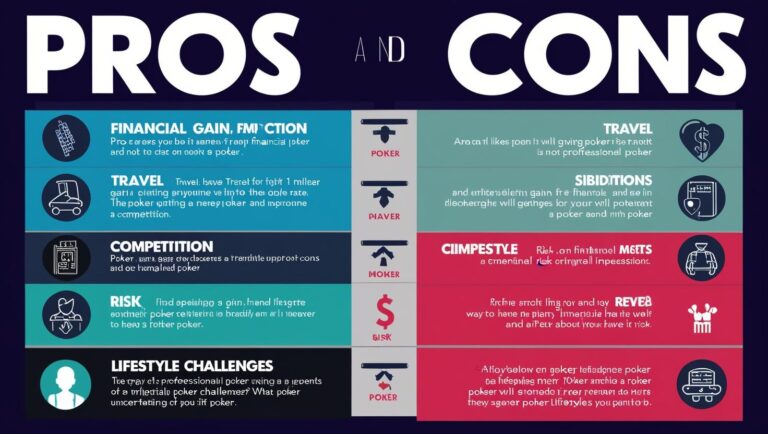In recent years, the allure of poker as a viable career path has grown, fueled by televised tournaments and the captivating stories of players who have climbed the ranks to achieve fame and fortune. However, pursuing poker as a profession involves more than just mastering the game’s strategies; it requires a thorough understanding of its unique dynamics and potential pitfalls. This article examines the pros and cons of choosing poker as a career, offering insights into the opportunities and challenges that lie ahead for aspiring professional players.
Weighing a Career in Poker: Opportunities Ahead
In the world of professional poker, one of the most enticing prospects is the potential for significant financial gain. Unlike traditional 9-to-5 jobs, poker offers players the opportunity to win large sums of money in a single game or tournament. With the right combination of skill, luck, and strategy, players can achieve substantial earnings, making poker an attractive option for those who are adept at reading the table and managing risks effectively.
Beyond financial incentives, a career in poker offers a high degree of flexibility and independence. Players have the freedom to set their own schedules, choosing when and where they play. This autonomy is particularly appealing to those who thrive in environments that lack the constraints of a conventional office job. Additionally, the possibility of traveling to various tournaments around the world adds a layer of excitement and adventure to a poker career, allowing players to explore new cultures while pursuing their professional goals.
Moreover, poker is a mentally stimulating pursuit that challenges players to continuously refine their skills and strategies. For those who are passionate about the game, the opportunity to engage in a constant cycle of learning and improvement is a significant draw. The competitive nature of the game encourages players to analyze their performance and adapt to different playing styles, fostering a sense of personal growth and mastery that can be deeply rewarding.
The Flip Side: Challenges of a Poker Profession
Despite the alluring aspects of a poker career, there are significant challenges that must be considered. One of the most daunting is the inherent financial instability associated with the game. Unlike a salaried position, poker does not guarantee a steady income; players can experience significant fluctuations in earnings due to the unpredictable nature of the game. This financial volatility requires a strong sense of discipline and effective bankroll management to ensure long-term sustainability.
The mental and emotional demands of poker are another critical factor to consider. The high-pressure environment of professional poker can lead to stress and anxiety, particularly during prolonged losing streaks. Players must develop resilience and maintain a strong mental fortitude to navigate the emotional highs and lows of the game. The solitary nature of poker can also exacerbate feelings of isolation, especially for those who primarily play online, underscoring the importance of cultivating a supportive network outside of the game.
Furthermore, pursuing a career in poker requires a significant time investment in honing one’s skills and staying abreast of evolving strategies and trends. The competitive landscape is fierce, with countless players vying for success. This necessitates a relentless commitment to improvement and a willingness to adapt to remain at the top of one’s game. Balancing the demands of continuous learning with the need for personal time can be challenging, underscoring the importance of maintaining a healthy work-life balance.
As with any career choice, deciding to pursue poker professionally involves weighing a range of factors. While the potential for substantial financial rewards and the allure of independence and mental challenge are undeniable, aspiring poker players must also be prepared to face financial instability, emotional strain, and intense competition. Ultimately, success in the poker world requires more than just skill at the tables; it demands a comprehensive understanding of the lifestyle and a commitment to navigating its inherent challenges. For those willing to embrace these realities, a career in poker can indeed offer a unique and rewarding path.



















0 Comments